We may not have the course you’re looking for. If you enquire or give us a call on +32 35001305 and speak to our training experts, we may still be able to help with your training requirements.
Training Outcomes Within Your Budget!
We ensure quality, budget-alignment, and timely delivery by our expert instructors.
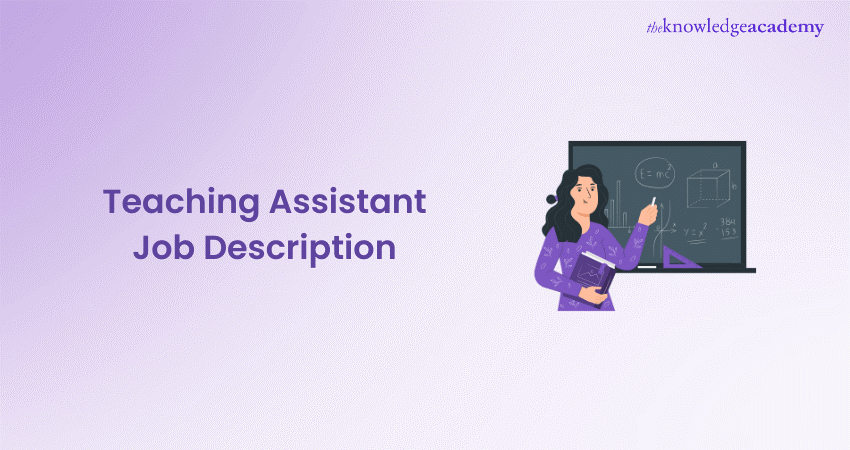
Teaching Assistants play a crucial role in enriching students' educational journey. If you’re passionate about making a positive impact in education, understanding a Teaching Assistant's job description is key. This blog explores the diverse tasks, essential skills, and qualifications needed to excel in this role, along with the fulfilling career opportunities it offers. Whether it’s providing classroom support or offering personalised assistance to students, discover how you can make a difference as a Teaching Assistant.
Table of Contents
1) Who is a Teaching Assistant?
2) Teaching Assistant Job Description
3) Responsibilities Of a Teaching Assistant
4) Skills and Qualifications of Teaching Assistant
5) Average Salary of a Teaching Assistant
6) Conclusion
Who is a Teaching Assistant?
A Teaching Assistant (TA) plays a vital role in the educational system, providing essential support to both teachers and students. Their responsibilities range from assisting students in understanding challenging concepts to helping teachers with lesson planning and classroom management. TAs are indispensable in creating an organised and effective learning environment.
Teaching Assistants are found across various educational settings, from early years and primary schools to secondary schools and higher education institutions.
a) Early Years and Primary Education: In these settings, TAs help young learners adjust to the school environment, providing them with the confidence and guidance needed for their academic and social development.
b) Secondary Schools and Higher Education: TAs often specialise in specific subjects, offering targeted academic support to students, helping them achieve a deeper understanding of the material.
c) Classroom Management: TAs contribute to maintaining an organised classroom, allowing teachers to focus on delivering lessons effectively.
d) Student Support: TAs are instrumental in providing individualised attention to students who need extra help, ensuring that no student falls behind.
e) Lesson Preparation: TAs assist in preparing educational materials, helping teachers create engaging and comprehensive lessons.
Teaching Assistant Job Description
Here is a sample template for your reference. It will help you better understand the responsibilities and requirements of a Virtual Assistant. Let’s dive in!
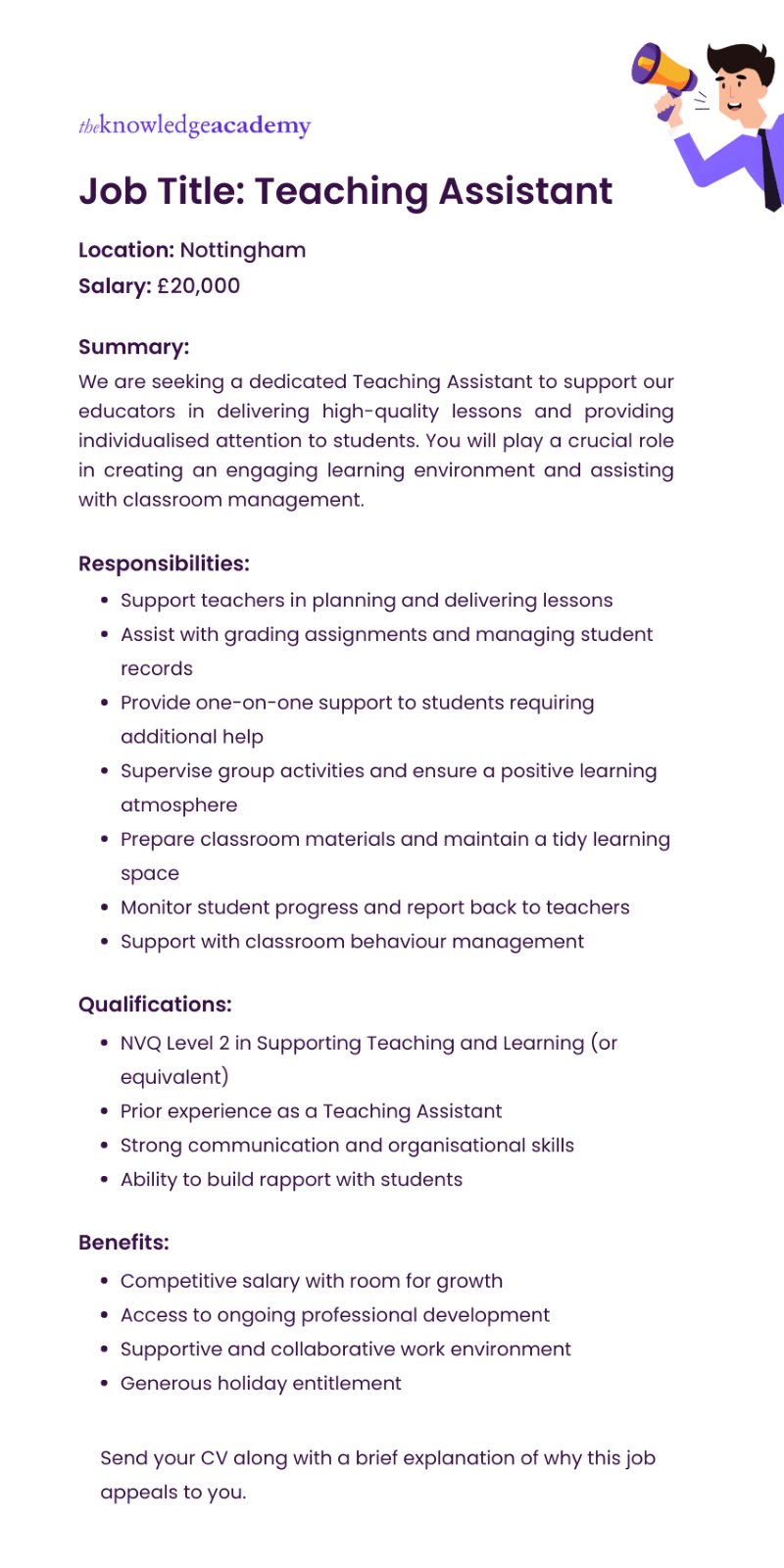
Responsibilities of a Teaching Assistant
The duties of a Teaching Assistant include a wide range of tasks that focus on enhancing the educational experience for students along with supporting teachers. Here’s a closer look at some of the core responsibilities:
a) Classroom Support: TAs assist teachers in delivering lessons effectively by setting up activities, managing classroom resources, and helping students during lessons. They often break down complex concepts into simpler terms to aid students who struggle with understanding the teacher’s instructions.
b) Individual and Group Assistance: TAs frequently provide one-on-one or small group support, focusing on areas where students need extra help. This can involve guiding students through challenging subjects, assisting with assignments, and reinforcing lessons to ensure comprehension.
c) Lesson Preparation: In the preparatory phase, TAs help organise teaching materials, set up equipment, and create visual aids to enhance lessons. They also contribute to adapting lesson plans to meet the diverse needs of students.
d) Behaviour Management: TAs play a crucial role in maintaining a disciplined and respectful classroom environment. They assist teachers in managing student behaviour, ensuring that the learning environment remains conducive to all students.
e) Tracking Progress: TAs closely monitor the progress of students they work with, often providing valuable feedback to teachers. Their observations contribute to parent-teacher conferences, where they highlight students' strengths and areas that require additional support.
f) Special Educational Needs (SEN) Support: TAs are instrumental in supporting students with special educational needs, using tailored teaching methods and specialised tools. They work in collaboration with SEN coordinators to develop personalised learning plans that cater to individual student requirements.
g) Administrative Tasks: TAs handle various administrative duties, such as maintaining records, managing student files, and other tasks that help keep the classroom organised and efficient.
These responsibilities highlight the versatile nature of a Teaching Assistant’s role, showcasing their importance in delivering quality education.
Measure your writing skills effectively by signing up for our Writing and Editing Course now!
Skills and Qualifications of a Teaching Assistant
A mix of interpersonal skills, technical knowledge, and formal qualifications is essential to thrive as a Teaching Assistant. Here are the key skills and qualifications required:
a) Communication Skills: Teaching Assistants need to communicate clearly and effectively with students, teachers, and parents. Their ability to articulate concepts in a way that students can easily grasp is essential for fostering understanding and academic success.
b) Patience and Empathy: Working with students, especially those with learning difficulties or behavioural challenges, requires a high degree of patience and empathy. These qualities enable TAs to build trust and provide the emotional support necessary for students to feel valued and supported.
c) Adaptability: The dynamic nature of a Teaching Assistant’s role demands flexibility. Each day presents new challenges, and the ability to adapt teaching methods to accommodate various learning styles is critical to meeting the diverse needs of students.
d) Teamwork and Collaboration: TAs are integral members of the educational team, working closely with teachers and other staff members. Being a reliable and cooperative team player ensures that the classroom operates smoothly and that students receive consistent support.
e) Basic Literacy and Numeracy Skills: A strong foundation in literacy and numeracy is important for TAs, as they often assist with core subjects like reading, writing, and mathematics. This knowledge allows them to effectively support students in these fundamental areas.
f) Organisational Skills: TAs must be highly organised to manage their varied responsibilities, from preparing lesson materials to addressing the needs of multiple students. Effective organisation ensures that tasks are completed efficiently and that the learning environment remains conducive to education.
g) Relevant Qualifications: While some entry-level TA positions may only require a high school diploma or equivalent, obtaining a Level 2 or Level 3 TA qualification can significantly enhance employment opportunities. For those interested in specialised roles, such as working with SEN students, additional certifications are often required to meet the specific demands of the position.
These skills and qualifications form the backbone of what it takes to be a practical Teaching Assistant, ensuring they can support students and teachers in achieving educational goals.
Master the skills to become a Virtual Assistant with our Virtual Assistant Course – Join today!
Average Salary of a Teaching Assistant
A Teaching Assistant's salary varies depending on factors such as location, experience, and qualifications. On average, the salary of a Teaching Assistant in the UK is:
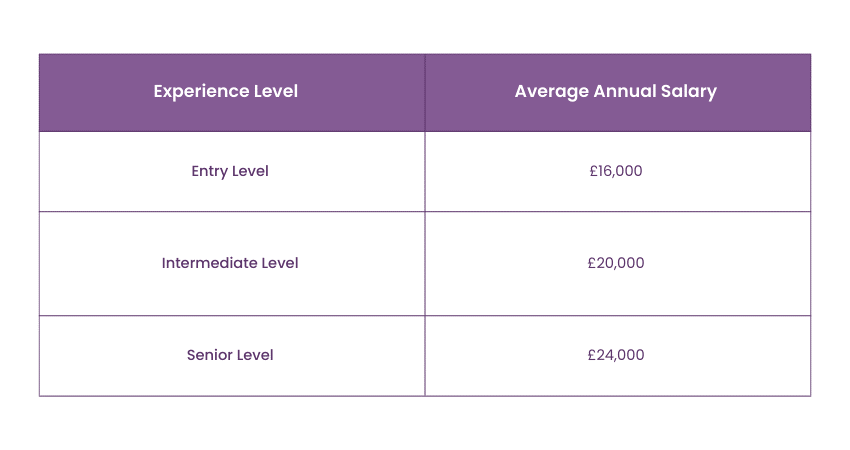
Source: Glassdoor
In the US:
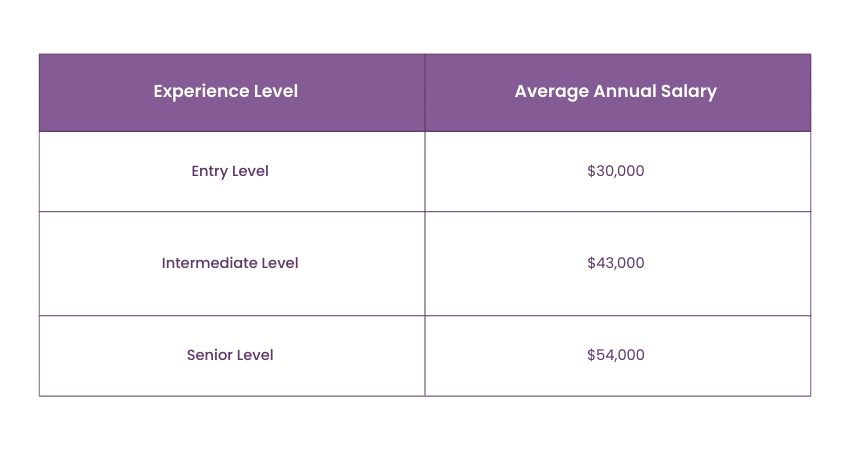
Source: Glassdoor
In India:
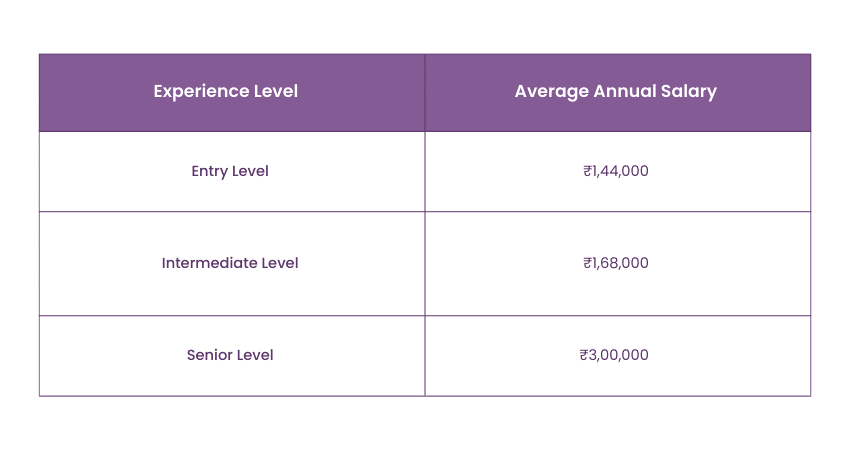
Source: Glassdoor
Conclusion
Through this blog, you now understand what a Teaching Assistant job description comprises. Becoming a Teaching Assistant is not just about supporting classroom activities; it’s about making a meaningful impact on students’ lives. With the right skills and qualifications, you can help shape the future of education and inspire the next generation. The role offers a rewarding career path filled with opportunities for personal and professional development. If you’re passionate about education and eager to make a difference, a career as a Teaching Assistant could be your perfect fit.
Learn how to become a Virtual Call Center Agent with our Virtual Call Center Training. Sign up now!
Frequently Asked Questions

While entry-level positions may require minimal qualifications, having a Level 2 or Level 3 TA certificate is beneficial. For more specialised roles, such as working with SEN students, additional qualifications and experience in special education are often required.

Many Teaching Assistants use their experience as a stepping stone towards a teaching career. With further studies, such as completing a degree in education and earning Qualified Teacher Status (QTS), TAs can transition into full-time teaching roles.

The Knowledge Academy takes global learning to new heights, offering over 30,000 online courses across 490+ locations in 220 countries. This expansive reach ensures accessibility and convenience for learners worldwide.
Alongside our diverse Online Course Catalogue, encompassing 19 major categories, we go the extra mile by providing a plethora of free educational Online Resources like News updates, Blogs, videos, webinars, and interview questions. Tailoring learning experiences further, professionals can maximise value with customisable Course Bundles of TKA.

The Knowledge Academy’s Knowledge Pass, a prepaid voucher, adds another layer of flexibility, allowing course bookings over a 12-month period. Join us on a journey where education knows no bounds.

The Knowledge Academy offers various Virtual Online Job Roles Training , including the Online Teacher Training, Virtual Assistant Course, and Online Product Manager Masterclass. These courses cater to different skill levels and provide comprehensive insights into Media Ethics.
Our Business Skills Blogs cover a range of topics related to Virtual Assistance, offering valuable resources, best practices, and industry insights. Whether you are a beginner or looking to advance your knowledge of Virtual Assistance. The Knowledge Academy's diverse courses and informative blogs have got you covered.
Upcoming Business Skills Resources Batches & Dates
Date
 Online Teacher Training
Online Teacher Training
Fri 22nd Nov 2024
Fri 28th Feb 2025
Fri 4th Apr 2025
Fri 27th Jun 2025
Fri 29th Aug 2025
Fri 24th Oct 2025
Fri 5th Dec 2025







 Top Rated Course
Top Rated Course



 If you wish to make any changes to your course, please
If you wish to make any changes to your course, please


